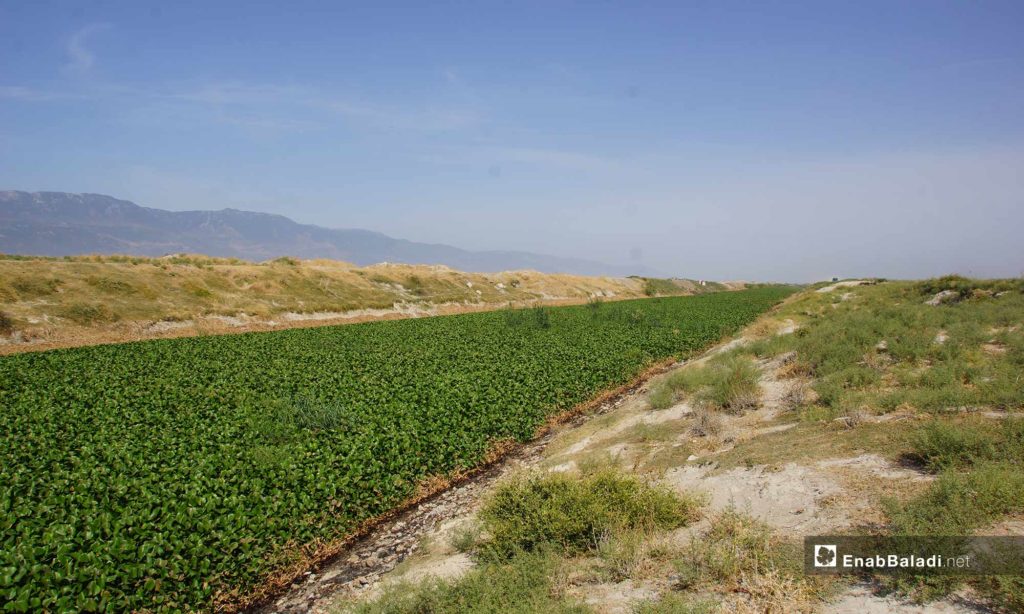After the checkpoints of the Syrian regime bombed Halfaya city in northwestern Hama province, “Abu Ahmed” and his family left the city in 2013, leaving the house behind along with its furniture and a 20 dunums (20,000 square meters) agricultural land, hoping to return after a while for the utilization of his property.
However, Abu Ahmed (a pseudonym for security reasons) could not return to the city of Halfaya, and he learned via some regime’s loyalist web pages that his land, whose annual crops were a source of income for him and his family, would be leased for those “who killed and displaced people,” according to what he said to Enab Baladi.
Despite having property titles (tabo) registered in the cadaster, Abu Ahmed believes that those who issued the recent decisions regarding the farmland owned by people displaced from the city do not recognize the law and want to “take revenge” by renting the lands to people other than their real owners.
Farmlands plowed by real owners only
The Head of the Military and Security Commission in Hama province, Ramadan Youssef al-Ramadan, issued a decision on 11 August, banning the plowing or working in farmlands by people other than their owners, until the commission formed by administrative order No. 3077 on 3 June 2020 ends its job.
According to a telegraph sent by al-Ramadan to Hama governorate, the decision was issued “after information came that some citizens were appropriating the lands.” According to the telegraph, the responsibility for implementing the decision lies on the municipal heads, political parties’ secretaries, heads of farmer offices, district managers, and commanders of security detachments.
The committee ended its land surveying work on 26 August, and an auction will be announced within the coming days under the auspices of the al-Baath Party branch in Hama and the al-Baath Party’s branch leadership in Mahardah city, north of Hama.
The Head of the Military and Security Commission decided to establish a committee for the surveying of agricultural lands owned by citizens who are outside the Syrian regime controlled-areas and wanted by the regime’s security services in Halfaya city, northwestern Hama, according to what the member of the “National Reconciliation Committee” in Hama and deputy chairman of Halfaya local council, Ayman Karmo Sayadi, published on his “Facebook” page on 23 August.
The “land surveying committee” submits reports daily to the city council and the al-Baath party teams in Halfaya regarding citizens absent from the Syrian regime controlled-areas, and about the people plowing and cultivating their lands.
Sayadi wrote that land plowing is forbidden unless by the landowner, and the son, brother or wife cannot grow the husband’s land only after obtaining an inheritance distribution order from the competent judiciary.
Sayadi called on those who want to lease the lands surveyed by the committee, estimated at a minimum price of 25,000 Syrian pounds (11 USD) per dunam for one year, to review the city council and the al-Baath party team to organize a list with their names for the al-Baath party’s branch to be auctioned after announcing the date and time of the auction.
Violations against the Syrian law
The Head of the “Free Syrian Lawyers” organization, lawyer Ghazwan Koronfol said to Enab Baladi that the Military and Security Commission’s decision violates the Syrian law. He said the decision tackles the al-Baath as the leading party of state and society, even though the constitutional provision that gave the party this status was repealed and no longer exists in the 2012 Syrian constitution.
According to Koronfol, the decision also prohibits the landowners from their right to dispose of their properties, whether by sell, mortgage, rent, investment, land management, or by authorization, which is a violation of property rights protected by the Syrian Constitution.
In addition, the decision prevents the heirs from managing and restricting the inheritance money by organizing a determination of inheritance, which is against the law, according to Koronfol.
He added that the Syrian law does not prevent the owner from authorizing whomever he wants to manage his money or preventing him from doing so because he is wanted by security services, which is considered an infringement of his rights and pillage of property without legal basis or judicial order.
Member of the “Free Hama Bar Association,” lawyer Ali al-Omar referred to Article No. 768 of the Syrian law, which states that “the owner has the sole right, within the limits of the law, to use, exploit and dispose of his/her property.”
The right to use property includes the owner’s use of it for whatever purpose, which can be done personally or via a legal agent.
While the right of usufruct is for the owner to perform the legal and material work necessary to use the property for its fruits and products or to lease or entrust others to it.
The right of disposition is the owner’s ability to do all material and legal work on the property, as the owner has the right to dispose of his property, grant, sell, inherit, renounce it or authorize someone to manage it.
Al-Omar said that the determination of inheritance is done by the heirs, as the inheritance is distributed among them after the owner’s death.
This report was prepared with the contribution of Enab Baladi’s correspondent in Idlib, Iyad Abdel Jawad

